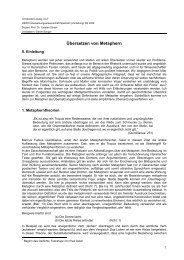Current Opinion in Investigational Drugs
Current Opinion in Investigational Drugs
Current Opinion in Investigational Drugs
Create successful ePaper yourself
Turn your PDF publications into a flip-book with our unique Google optimized e-Paper software.
14<br />
Editorial overview<br />
The genome: Five years on<br />
Michael Williams<br />
Address<br />
Department of Molecular Pharmacology and Biological Chemistry<br />
Fe<strong>in</strong>berg School of Medic<strong>in</strong>e<br />
Northwestern University<br />
Chicago<br />
IL 60611<br />
USA<br />
Email: mazar<strong>in</strong>e1643@comcast.net<br />
<strong>Current</strong> <strong>Op<strong>in</strong>ion</strong> <strong>in</strong> <strong>Investigational</strong> <strong>Drugs</strong> 2006 7(1):14-17<br />
© The Thomson Corporation ISSN 1472-4472<br />
In 2001, one of the major milestones <strong>in</strong> the history of<br />
biomedical research was achieved, namely the publication of<br />
draft maps of the human genome [1,2], an activity that was<br />
reportedly completed <strong>in</strong> 2003 [3]. This was <strong>in</strong>evitably<br />
accompanied by various predictions that the discrete<br />
molecular source of all human diseases would soon be<br />
known [4-6] and, as a consequence, that the path to the<br />
discovery of novel, more efficacious and safer drugs, based<br />
on as yet unknown and unproven targets resident <strong>in</strong> the<br />
genome, would be exponentially more facile, more<br />
productive, faster and cheaper, ow<strong>in</strong>g to the unique diseaseassociation<br />
of the targets. The then US President, Bill<br />
Cl<strong>in</strong>ton, predicted that 'with this new found knowledge,<br />
humank<strong>in</strong>d is on the verge of ga<strong>in</strong><strong>in</strong>g immense new power<br />
to heal' [7]. Conversely, recent research by Accenture/CMR<br />
International notes that 'only 3% of projects aimed at new<br />
targets will enter precl<strong>in</strong>ical development compared with<br />
17% for projects on established targets' [8].<br />
Almost five years later, an <strong>in</strong>formal survey of 500 scientists<br />
<strong>in</strong>volved <strong>in</strong> the drug discovery process found that 67% were<br />
unconv<strong>in</strong>ced that the genome maps had 'even moderate<br />
effects on drug research' [9]. Similarly, biotechnology<br />
<strong>in</strong>dustry observers and genomic scientists cautioned that the<br />
promised 'fruits of genomics' [10] are unlikely to emerge <strong>in</strong><br />
the near future, with a 10 to 20 year timeframe be<strong>in</strong>g<br />
considered more likely [11].<br />
Additionally, <strong>in</strong> follow<strong>in</strong>g the theme of us<strong>in</strong>g novel<br />
approaches to f<strong>in</strong>d<strong>in</strong>g new drugs, <strong>in</strong> this same group of 500<br />
scientists, 64% 'considered that their organization, at best,<br />
only supported <strong>in</strong>novation to a moderate extent' [9], echo<strong>in</strong>g<br />
similar comments made by Drews [12] and Vagelos [13].<br />
This f<strong>in</strong>d<strong>in</strong>g <strong>in</strong>dicated a disconnect between the concept of<br />
<strong>in</strong>novation−'the act of <strong>in</strong>troduc<strong>in</strong>g someth<strong>in</strong>g new'−that is<br />
religiously cited as the driver for drug discovery [8,14], and<br />
the rampant technology acquisition and implementation <strong>in</strong><br />
the biotech and pharmaceutical <strong>in</strong>dustries over the past<br />
decade. Clearly, the acquisition of enabl<strong>in</strong>g technologies is<br />
very dist<strong>in</strong>ct from their effective use and subsequent ability<br />
to impact the way th<strong>in</strong>gs are done. In reflect<strong>in</strong>g on the<br />
contributions of the late Paul Janssen to the pharmaceutical<br />
<strong>in</strong>dustry, Black noted that successful drug discovery should<br />
avoid 'wishful th<strong>in</strong>k<strong>in</strong>g' and superficiality, and focus <strong>in</strong>stead<br />
on conception, concentration, commitment and creativity<br />
[15]. In this context, the strategic management of the<br />
drug-discovery process appears critical to support the<br />
process of <strong>in</strong>novation and entrepreneurship [16] to ensure<br />
that the enabl<strong>in</strong>g technologies actually contribute to, rather<br />
than diffuse, the focus.<br />
As with many of the new technologies <strong>in</strong> biomedical<br />
research, the expectations for genome-based <strong>in</strong>formation<br />
have far outweighed their fledgl<strong>in</strong>g status with 'overhyp<strong>in</strong>g'<br />
be<strong>in</strong>g a frequently expressed concern [17-20]. Genetics was<br />
described as a 'science of exceptions' by Jones <strong>in</strong> 2000, with<br />
human life expectancy far more dependent on the<br />
environment (epigenetics) than the genome (genetics) [17].<br />
Jones also noted that geneticists have made promises<br />
regard<strong>in</strong>g the deliverables <strong>in</strong> genetics for decades,<br />
controversially suggest<strong>in</strong>g that four letters of the genetic<br />
code might more reasonably be H, Y, P and E.<br />
However, hype related to new technology <strong>in</strong>troductions is not<br />
unique to either the genome or biomedical research and has<br />
been formalized <strong>in</strong> Fenn's 'hype cycle' (Figure 1) [21]. Initially<br />
used <strong>in</strong> 1995, the concept has been more broadly extended to<br />
the maturity and adoption rates of a wide range of emerg<strong>in</strong>g<br />
technologies <strong>in</strong> different <strong>in</strong>dustries. The question for the<br />
genome-based, biomedical research enterprise <strong>in</strong> 2006 is where<br />
genome-based drug discovery currently lies on the maturity<br />
scale. One may argue that the thought leaders <strong>in</strong> genomics are<br />
still operat<strong>in</strong>g <strong>in</strong> the 'peak of <strong>in</strong>flated expectations', while those<br />
reduc<strong>in</strong>g the genome to practice (by fiat or choice) <strong>in</strong> pharma<br />
and biotech are operat<strong>in</strong>g <strong>in</strong> the 'trough of disillusionment'<br />
(Figure 1) [9]. The sceptics are at least ahead of the pundits on<br />
the hype cycle abscissa of maturity.<br />
While many heritable disorders have already been identified <strong>in</strong><br />
which a mutation <strong>in</strong> a s<strong>in</strong>gle gene is necessary and sufficient to<br />
produce a disease, critics of genome-based drug discovery have<br />
po<strong>in</strong>ted out that the genetic associations for Hunt<strong>in</strong>gton's<br />
disease [22], sickle cell anemia [23] and cystic fibrosis [24] were<br />
known before the mapp<strong>in</strong>g of the genome and, despite the<br />
identification of discrete molecular lesions <strong>in</strong>volv<strong>in</strong>g these<br />
associations, have yet to yield effective treatments. Similarly, <strong>in</strong><br />
the Alzheimer's disease (AD) field, the two key mechanisms<br />
thought to contribute to disease progression and neuronal<br />
death−amyloid β deposition and tau hyperphosphorylation<br />
[25]−together with the genetic association of AD with<br />
apolipoprote<strong>in</strong> E alleles [26], have been active research targets<br />
for many years with, aga<strong>in</strong>, little progress hav<strong>in</strong>g been made <strong>in</strong><br />
either understand<strong>in</strong>g the orig<strong>in</strong> and contribution of the<br />
molecular lesion to disease etiology or how this knowledge can<br />
be used to f<strong>in</strong>d effective treatments. Of additional concern <strong>in</strong><br />
the area of AD therapeutics is that the National Institute for<br />
Health and Cl<strong>in</strong>ical Excellence <strong>in</strong> the UK has recently<br />
recommended that the drugs currently approved for use <strong>in</strong> the<br />
treatment of AD (eg, donezepil) are no longer prescribed,<br />
because their benefit to the patient does not justify their cost<br />
[27]; the implications of this recommendation represent part of<br />
a much broader debate [28].

















